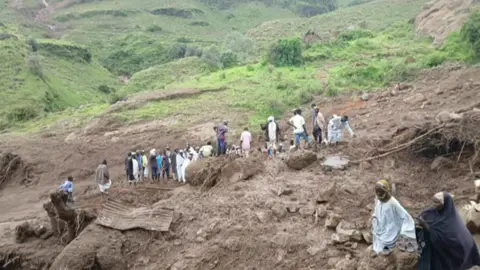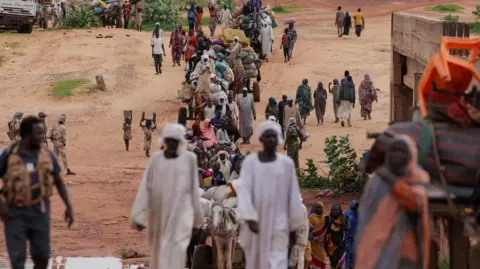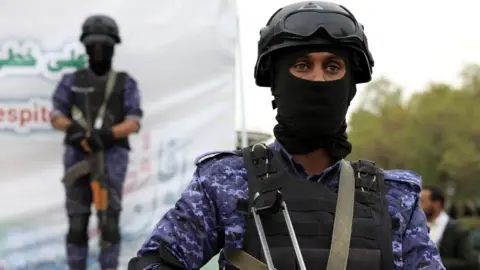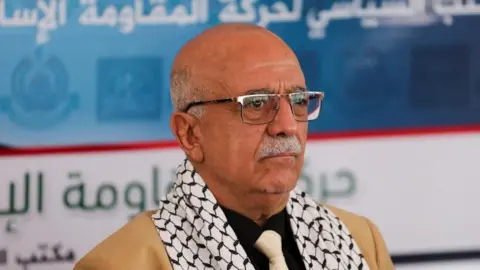Mothers and staff tell of global charity's role in child disappearances under Assad regime
Reem al-Kari and her cousin Lama are searching through dozens of photos of children spread out on a desk. Lama thinks she spots one with a likeness to Karim, Reem's missing son.
Karim was two-and-a-half when he and his father disappeared, in 2013 during Syria's civil war, as they ran an errand. He is one of more than 3,700 children still missing since the fall, 10 months ago, of the Assad dictatorship. He would now be 15.
Are his eyes green? asks the man behind the desk, the new manager of Lahan Al Hayat, a Syrian-run children's shelter which former first lady Asma al-Assad helped establish in 2013. He is looking at one of the photos the women have picked out, comparing it to a photo of Karim aged two.
Yes, comes the reply.
The hairline… the man muses. There is a similarity but… His voice trails off. The task is enormous.
Lahan Al Hayat is one of several Syrian childcare facilities which were used to hold the children of detained parents during the 2011-2024 civil war. Instead of re-homing the children with their relatives, the youngsters were held in orphanages and used as political pawns. In some cases, the children were falsely recorded as orphans, or their identities changed, making tracing them - then and now - all the more difficult.
When Assad's dictatorship suddenly collapsed in December, journalists, activists and families had access to sources, locations and documents previously unimaginable under his decades-long rule. The BBC World Service has worked with investigative media organisation Lighthouse Reports and five other outlets, to build a database of 323 children hidden by the Syrian regime from their relatives in a network of orphanages. We did this by reviewing and authenticating thousands of leaked and gathered documents.
Analysis of these records shows the organisation running orphanages which took more children than any other was an Austria-headquartered charity, SOS Children's Villages International. SOS operates in more than 130 countries and raises about €1.6bn ($1.9bn) a year, including from the UN, European governments and personal donations.
We spoke to more than 50 SOS whistleblowers. Several said most of the senior positions at SOS in Syria had been appointed directly by the Assad palace, and that Asma al-Assad - who, along with her husband Bashar, was sanctioned by the EU and the UK for human rights abuses - had an influential role in the organisation.
We were also told that the charity began bringing in any child regardless of their circumstances to obtain more funding.
SOS responded: We do not offer financial rewards for increasing the number of orphans, and denied any formal link between the charity and the Assad family.
SOS has already admitted, following an internal review, that 140 children without proper documentation were taken in by SOS Syria between 2013 and 2018. It has said 104 of these were subsequently taken back by the Syrian intelligence services or the Social Affairs Ministry, and of whose whereabouts SOS now has no knowledge.
The charity has also said it had stopped receiving children of political detainees in 2018, but we have seen paperwork indicating their transfer to SOS up until 2022.
- When requested by the Assad government or intelligence services to send children back to them, did not check who would be looking after them next.
- Received children whose identities it knew had been changed and, in one case, itself gave a child in its care an official different name.
- Complied with Syrian intelligence instructions that relatives should be refused permission to visit and should not be granted custody, or be given information about the children.
- Forbade staff from showing the children photos of - or discussing - family.
- Has been slow to, or has not, engaged with mothers seeking information since the regime fell which could help them find their children.
SOS International told us: We deeply regret that children were forcibly separated from their families and that families spent years without knowing where their children were. This should never have happened, and we are committed to learning from the independent investigations to ensure we do better in the future.
Its interim CEO, Benoît Piot, added in an interview with us that the charity had been following the orders of the Syrian government which he called a terror system under Assad.
Many parents still have no idea what happened to their children. The quagmire of falsified and lost records for Syria's missing children means surviving mothers and fathers are left to hunt from one institution to the next for any information at all.
This includes Reem, looking for her son Karim. It is impossible for her to know if he was taken in by SOS or any other institution in Syria that took in the children of detainees. But she thinks the fact her husband was wealthy - putting him at risk under the cash-poor Assad regime - and was spotted in prison in 2016, makes it likely he was arrested, and therefore her son sent to an orphanage.
Before she drew a blank at Lahan Al Hayat, she visited Syria's Social Affairs Ministry, where she was told the minister was abroad, the manager in charge of the missing persons file was on holiday, and then that work on missing children had been transferred to a security agency on the ministry's fifth floor.
Reem went upstairs, accompanied by a BBC film crew. We were promptly told to stop filming despite having permission to do so, and the ministry refused to provide Reem with any further assistance.
A new investigation into the fate of the children under the previous regime was announced by the ministry in May. But it has limited staff and resources, with just a few volunteers tasked with reviewing thousands of documents, and has yet to release any findings.
Reem next visited another orphanage known for taking in boys of Karim's age. On her phone, she pulled up her son's photo and showed it to the institution's director, who responded with a silent shake of the head. Reem's eyes filled with tears - a rare break in her steely composure.
Finally, she visited SOS Syria, which was led until recently by Samar Daaboul, the daughter of a close Assad aide. Ms Daaboul has denied her family links have influenced her work.
Reem was asked for Karim's date of birth, but she pointed out to staff that this may not be of any use given records were often changed. Instead, she asked to see photos of the children SOS had taken in. It refused, citing the need to guard privacy.
A few weeks later, she received an email from SOS International stating the charity would respond to her within six months, recommending she also contact SOS Syria directly.
Other parents have told us they are still waiting for a response from SOS months after contacting it.
Some former and current SOS employees speak of a lack of urgency in dealing with this crisis. When SOS Syria raised these issues with SOS HQ, senior executives didn't want to know the details and hid from concrete action and responsibility, said a former senior SOS International manager who wished to remain anonymous.
Unlike Reem, Omama Ghbeis has since been reunited with her children. But for the first two of the three years she was imprisoned because of her humanitarian work, she had no idea where they were. Her daughters Layla and Layan had been taken in, aged four and eight, by SOS Syria.
Omama remains vehemently critical of the charity's role in her children's destabilizing experiences, echoing the sentiments of many other families we interviewed who hold SOS similarly accountable.
As calls rise for accountability from both the charity and the Assad regime, the journey for many parents searching for their children in Syria continues, clouded with frustration and uncertainty.

















